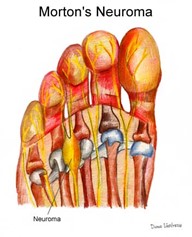Morton’s Neuroma
Sports & Family Podiatry
Sports & Family Podiatry
What is it?
A neuroma is a noncancerous (benign) growth of nerve tissue that can develop in various parts of your body. Morton’s neuroma occurs in a nerve in your foot, often between your third and fourth toes. The condition involves a thickening of the tissue around one of the nerves leading to your toes.
How does it happen?
The condition seems to occur in response to irritation, pressure or injury to one of the digital nerves that lead to your toes. The growth of thickened nerve tissue (neuroma) is part of your body’s response to the irritation or injury.
How does it feel?
Morton’s neuroma causes a burning pain in the ball of your foot that may radiate to your toes. You may notice some tingling in your toes. At first, the pain may worsen when you wear tight or narrow shoes or engage in activities that place pressure on your foot.

What should you do?
If you have or suspect you have a Morton’s neuroma, you should consult your nearest Podiatrist or sports medicine professional. They can assist in diagnosing the problem and establishing its severity. From this, an appropriate treatment plan will be developed.
What shouldn’t you do?
You shouldn’t ignore the problem. If you don’t seek treatment, it is likely to get worse. Avoid wearing tight or narrow shoes and carrying out activities that place pressure on your foot.
How is the condition treated?
Initial therapies are nonsurgical and relatively simple. They can involve one or more of the following treatments:

56 Zahel St, Carina QLD 4152
Sports & Family Podiatry
Clem Jones Wellness Precinct
56 Zahel St, Carina QLD 4152
F (07) 3156 9917
Mon/Tue/Wed/Thursday/Fri:
8:00am – 6:00pm
Sat:
9am-12pm
Sun:
Closed


neuroma, nerve, medicine, shoe, foot, pain, toe, mortons neuroma, injection, neurectomy, podiatrist, footwear, corticosteroid, heel, treatment
Morton’s Neuroma is a condition characterized by the thickening of tissue around one of the nerves leading to your toes, commonly occurring between the third and fourth toes. This painful condition can significantly impact mobility and quality of life, making it essential for individuals experiencing symptoms to seek professional help.
Symptoms of Morton’s Neuroma often include sharp, burning pain in the ball of the foot, tingling, or numbness in the toes. These symptoms can worsen with specific footwear or activities that put pressure on the foot. Early diagnosis and intervention are crucial to managing discomfort and preventing the condition from worsening.
The exact cause of Morton’s Neuroma is not fully understood, but several factors can contribute to its development. These include wearing tight or high-heeled shoes, engaging in high-impact sports, and having foot deformities such as bunions or flat feet. Understanding these risk factors can help individuals make informed choices about their footwear and activities.
Additionally, repetitive trauma to the foot from activities like running or dancing can increase the likelihood of developing Morton’s Neuroma. Individuals with certain foot structures are also at higher risk, making it important to consider both lifestyle and anatomical factors when assessing the potential for this condition.
Treatment for Morton’s Neuroma typically begins with conservative measures aimed at alleviating pain and discomfort. This may include changing footwear to more supportive options, using orthotic devices, and engaging in physical therapy. These approaches aim to relieve pressure on the affected nerve and promote healing.
For more severe cases, medical interventions such as corticosteroid injections or radiofrequency ablation may be recommended. These treatments can provide significant relief by reducing inflammation and pain signals. In rare cases where conservative treatments fail, surgical options may be explored to remove the neuroma, highlighting the importance of consulting a podiatrist for tailored treatment plans.
Preventing Morton’s Neuroma involves making conscious choices about footwear and foot health. Wearing shoes that offer adequate support and a wider toe box can help reduce irritation on the nerves in the foot. Additionally, incorporating foot exercises to strengthen the muscles and improve flexibility can be beneficial.
Regular check-ups with a podiatrist can also aid in the early detection of foot issues before they develop into more serious conditions. By adopting preventive measures and being mindful of foot health, individuals can significantly lower their risk of developing Morton’s Neuroma.
